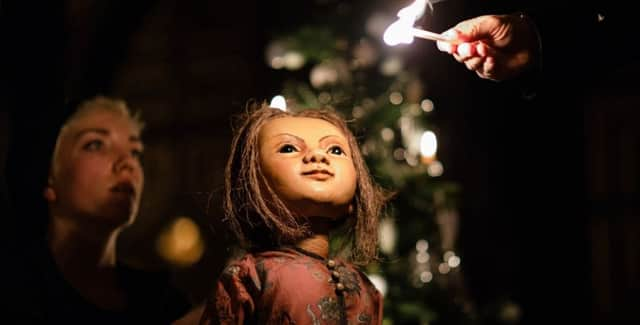Review: Imaginative take on fairy tales strikes a chord


Shakespeare’s Globe and Bristol Old Vic have collaborated to produce an imaginative re-telling of some Hans Christian Andersen tales.
The show was performed to appreciative audiences at Buxton Opera House from March 6 to 10.
Advertisement
Hide AdAdvertisement
Hide AdThe adapted tales were ‘Thumbelina’, ‘The Emperor’s New Clothes’ and ‘The Princess and the Pea’, with ‘The Little Match Girl’ as a framing device. Each tale was recounted through poetry, song, physical theatre, dance and puppetry. An on-stage band played with verve, and the singing and movement were stunning. This was a delightful, multi-media theatrical treat.
The stage conjured up a sort of war-torn no-man’s land or refugee camp. Snowflakes fell to create a cold, hostile environment. At the striking of a match, the stage lit up and strolling players in quirky colourful costumes, reminiscent of music hall and circus, performed the tales with gusto. This was an extremely talented cast who seemed to enjoy communicating with the audience. There were silly jokes, and the leader of the troupe incorporated snatches of impersonations including Tommy Cooper, Eric Morecambe and Donald Trump (or the Twit of Twitter, as he was dubbed.) The children seemed to particularly enjoy the sight of the emperor in his flesh-coloured body suit.
This production was plenty of fun but the tales were updated to reflect modern truths (never in a heavy or ‘preachy’ way). In ‘Thumbelina’, the way the inhabitants of the insect city reject the tiny child resonated with the experience of refugees. The field mouse lures her in to serve Mr Mole, which gave a sense of child slavery and domestic abuse. ‘The Emperor’s New Clothes’ was a satirical portrait of the world of fashion, as well as the petulance and self-delusion of the powerful. In ‘The Princess and the Pea’, the princess served ‘Time’s Up’ on the prince, who clearly had major trust issues.
At the end of the show the Little Match Girl (beautifully and poignantly portrayed by the expert puppeteer) lay down in the snow and died. She came to represent the vulnerable, the poor, the excluded and the homeless. She expired when the last match was struck, signifying that there were no more stories to be told. The message I got was that without stories, humanity cannot survive.
Thank goodness we have theatre companies of such skill and inventiveness to keep these narratives alive, fresh and topical.